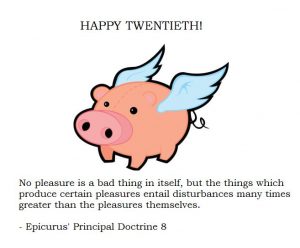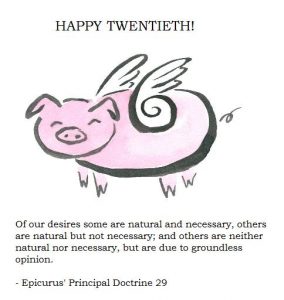A Communal Philosophy: the Origins
Epicureans in antiquity were called the Twentyers (eikadistae) because they were known to celebrate the 20th of every month with feasts celebrating philosophy, community and food, as well as the culture and trust that develops around the table. They knew that food, like music, creates community, and any doctrine that teaches that friends are one of the greatest goods must naturally facilitate the process of making and nurturing friendships.
Epicurus in his will established the celebration of his and his friends’ birthdays, as well as the 20th of every month “according to the rules now in force“. This indicates that the tradition emerged during his lifetime and, by the time he died, had become no less than a communal obligation enforced by the leaders of the school.
And from the revenues made over by me to Amynomachus and Timocrates let them to the best of their power in consultation with Hermarchus make separate provision for the funeral offerings to my father, mother, and brothers, and for the customary celebration of my birthday on the tenth day of Gamelion in each year, and for the meeting of all my School held every month on the twentieth day to commemorate Metrodorus and myself according to the rules now in force. Let them also join in celebrating the day in Poseideon which commemorates my brothers, and likewise the day in Metageitnion which commemorates Polyaenus, as I have done previously.
– Epicurus’ will
The Four Men
The honor paid to a wise man is itself a great good for those who honor him.
– Vatican Saying 32
While the original custom was to honor Epicurus and Metrodorus (who died before Epicurus died), the idea is to celebrate the covenant of friendship that bind us to each other and to the Epicureans of the past.
The school has a tradition of plural leadership that dates back to its beginnings and officially recognizes not one, but four founders. This, in spite of the fact that the tradition bears the name of Epicurus (to forever celebrate his memory), is indicative of how in that first Garden he earned the love and loyalties of his followers and how he exemplified the ideal friend among his associates, looking after their children, ensuring in his will that they would be taken care of, and frequently writing letters to them expressing his gratitude and affection.
Of Metrodorus, we know that Philodemus in later centuries cited him as an authority to show that he was basing his teaching on that of previous scholarchs, so that his writings (now lost to us) circulated among the generations that came after.
As to Hermarchus, we know that he was the first convert and companion of Epicurus. He first learned the teaching from Epicurus in the island of Lesbos at the earliest beginnings of Epicurus’ teaching career. As for the mild and friendly Polyaenus, we know that he was a mathematician from Lampsachus who joined them after their exile from Mytilene.
It’s in Lampsachus that the first school was founded and the first Epicurean community emerged. Later, in Athens, under Epicurus as Hegemon (Leader), the other three assumed the role of teachers and leaders of the community (kath-hegemones).
The recognition of four founders additionally gives us an idea of how the original doctrine slowly evolved, developing and gaining coherence as a result of these four men asking each other questions and attempting to answer them, jointly elaborating slowly and organically a cogent, complete worldview based on the insights of the atomists that had come before them. They were not just challenged by philosophers from other schools. They had developed a culture of reasoning together where certain doctrines had been agreed upon as shared conclusions, but they continued to evaluate the repercussions of the teachings as they applied the prudence gained in their daily lives.
It is within this context that Epicurus, in his will, established the tradition of celebrating the 20th of each month as a way to perpetuate the wholesome discourse that he and his friends had initiated for the benefit of the future generations of humanity.
In this sense, while Epicureanism required introspection, challenged our vain desires and attachments, and affirmed our subjective pleasure principle (all components of a private, inner spiritual revolution), it was always at the same time a communal philosophy.
The Feast of Wisdom
According to Philodemus of Gadara, Epicurus on the 20th decorated his house with the fruits of the season and invited everyone to the feast. Notice that Philodemus specifically spoke of food as art, as decoration. This suggests that traditionally on the 20th the plates were festive, artful and in opulent display, perhaps adorned with flowers and served in beautiful and colorful trays.
One can imagine the sumptuous Mediterranean banquet: warm pieces of bread and a variety of bowls of cheese must have been featured, as we know Epicurus loved cheese. Dates, figs, and other fruits in season would have been featured and, no doubt, wine. Let’s not forget artichokes and olives.
Most ancient Greeks rarely ate meat because they could not afford it, except during religious festivals when animals were sacrificed and fed the people. Fish, on the other hand, was enjoyed from time to time by most Greeks.
We should look for someone to eat and drink with before looking for something to eat and drink, for dining alone is leading the life of a lion or wolf – Epicurus
People went to the 20th feasts not just for the food, but most importantly for the company. It is easy to imagine that for such a cheerful occasion, the early Twentyers did not just feast and study philosophy: they sang, danced and toasted with friends. Music, in particular, has the power to create a sense of collective identity and territoriality. On special occassions, perhaps with the visit of distinguished guests, there may have been performances or didactic story-telling.
In preparation for the feast, every month we can imagine that one group of Twentiers learned recipes and enjoyed the process of cooking and putting together the artful presentation of the food. It’s undeniable that the culinary arts were part of what made the 20th special.
There is a nurturing, almost motherly aspect to the act of feeding someone, which helps to elicit trust and create a sense of community. Seneca reports that there were Epicureans whose role was to welcome guests to the event, answer whatever questions on philosophy they had, offer them food and generally make them feel at home.
The Philosophers’ Sabbath
In the Jewish tradition, it is often said that not only have the Jews kept the Sabbath but that the Sabbath has kept the Jews. In other words, the rabbis recognize that the establishment, from its inception, of a tradition of periodic rememberance of their Jewish identity helped to ensure their persistence throughout the generations in spite of vicious persecution, successful assimilation in Babylon, Europe, America and the various other migratory experiences, and in spite of the horrors of genocide.
Should we not see the 20th as having been intended to become a similar salt and spice, an ingredient needed for a community’s preservation, a sort of ethical materialist philosopher’s Sabbath? Communal feasting on the 20th may have contributed greatly to the continuity of Epicureanism as a living, culturally vibrant school that persisted for seven centuries, a very successful career for a school of philosophy, and testimony to philosophy’s power to bring people together. A mere doctrine rarely does this: it requires music, food, culture, friendships, loyalties, a sense of community, and seasonal gatherings fixed in the calendar so that members can re-member.
The 20th is also a pleasant practice: it’s joyful, not the somber and sober discipline that most people today imagine philosophy to be. Even if there weren’t a thousand reasons behind it, it would still be an enjoyable and auspicious feast to attend. Therefore, Friends of Epicurus should consider reinstituting modern versions of the tradition of celebrating the Twentieth.
Also read:
Luis Granados has written Happy Twentieth!, a testimonial piece for The Humanist on how he celebrates the 20th. He proposes that celebrating the 20th with close friends is a more intimate alternative to Sunday Assemblies for non-religious people.
A Naturalist Evaluation of Equality: the Public Tables, from the Autarkist Blog









